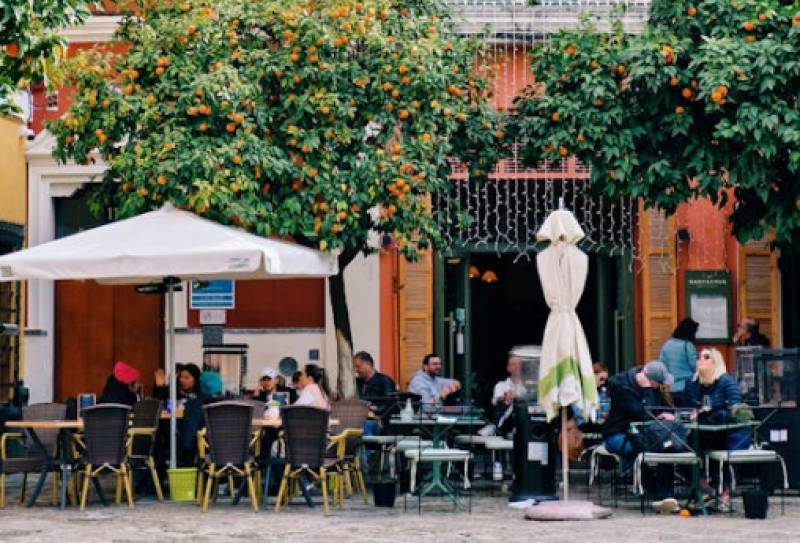
To be listed on the haciendadelalamo TODAY MAP please call +34 968 018 268.
Understanding the funeral process in Spain
In Spain it is the norm to plan ahead for your funeral. It’s all part of making things easier for the family and loved ones
The cost of a funeral in Spain continues to rise and most Spanish families take out some kind of funeral plan to cover the inevitable expense and also to the administrative headache at what is, of course, a difficult time.
Under Spanish law, the police or the Guardia Civil) must be called and a doctor contacted. The doctor will issue a temporary certificate, after which either the doctor or the police will contact a local funeral director (or tanatorio) to attend to the deceased. The funeral director (who may not speak English) will ask for a ‘release form’ to be signed and in many cases this form turns out to be part of a service contract, one that does not disclose prices until after all the arrangements have been made. This contract with the funeral director also often takes away any control over the funeral arrangements, and therefore the final price.
 Taking care of the process in advance by means of a funeral plan is clearly greatly reassuring for all concerned.
Taking care of the process in advance by means of a funeral plan is clearly greatly reassuring for all concerned.
- All Spanish families have funeral plans or funeral insurance. In most cases, the whole family is covered, even the smallest of children, and as a funeral represents a major expense for a family, provisions are made for this in a practical fashion.
- According to some sources, the cost of a funeral director’s services, items such as a casket, hearse, and a service, can total up to 4,900 euros for even a modest affair. Add to this reports of funeral directors refusing to act until they are certain the money is available to pay the bill, and the attraction of a Spanish funeral plan is clear – it avoids a lot of potential stress at what is certainly a difficult enough time as it is.
The timescale of the funeral process
- Another factor that is different in Spain is the speed of the process. It’s standard for burial or cremation to take place much quicker than the UK and English-speaking ex pats can be caught unawares by the rapid procedure (and potentially unscrupulous funeral directors on the lookout for the newly-bereaved caught without insurance). Whilst it is common practice in the UK to carry out autopsies, and permit preparation time for a funeral, Spanish law dictates that Spanish nationals must be interred within 72 hours and autopsies are only carried out in extreme circumstances.
- Most hospitals do not have storage facilities, and the deceased are collected immediately by the family funeral director and removed to a chapel of rest for the family to pay their respects, from whence they are transferred to the crematorium.
- As UK citizens, we are not bound by the same legislation, and can insist on a longer period of time to enable family arrangements to be made, although it is commonplace for a Spanish funeral director to tell bereaved ex-pats that the funeral must take place within the same timescale.
- All deaths must be registered by law, within 24 hours.
 Choice of Funeral Director and location of funeral
Choice of Funeral Director and location of funeral
- Spanish families will generally carry a card stating a preferred funeral director as part of their insurance documentation.
- Many non-spanish speaking ex-pats have been caught out by the process with no insurance and have signed release paperwork authorizing the transfer of the deceased to a funeral director and not realizing the significance of the paperwork signed. Once the written agreement has been signed, it is virtually impossible to arrange for the deceased to be moved to another location, and the bereaved will have no control over the location of the funeral.
 The Funeral process in Spain
The Funeral process in Spain
- A Spanish funeral director will lay out the deceased to enable the family to pay their respects for 24 hours before cremation. It is not normal practice to select preferred garments or apply make up and treasured personal possessions as would be expected in the UK, and the deceased will be behind a glass screen, not in a chapel of rest.
- Cremations are not carried out at the tanatorio, but are sent to a crematorium after the funeral service.
- Cremations are actually carried out in the open at the crematorium, there is not the same discreet curtain and music as in many UK locations, where the cremation occurs immediately after the service.
- A Spanish funeral director will arrange for a minister to perform the funeral service, and in the case of an English speaking family will call an English speaking minister.
What is the process if death occurs in the home?
Death in the home.
- The normal procedure in these cases is to call an ambulance to the scene.
- If the death appears to be sudden, the guardia arrive and if the circumstances appear in any way unusual will call out forensics.
- It is normal for the deceased to be removed quickly, and the funeral director will arrive promptly to do this.
- Unless the deceased has a pre-determined funeral director, the medical services will contact a preferred director, and the same situation can occur as within the hospitals.
- The bereaved are often unaware that the release papers signed at this point will dictate the location of the funeral, so sign for the removal of the deceased, without understanding that once the deceased has been taken, that this is where the funeral will be held and they will have no control over its location.
- The Spanish funeral process is a lot quicker than in the UK.
- Spanish citizens predetermine their choice of director and place of funeral through funeral plans and insurance.
- Many ex-pats sign release paperwork, not understanding what they are signing, and what the funeral process comprises.
- The main recommendation as a result of this, is to understand the process involved, make some degree of provision for the future, and Do Not sign any documentation presented in the case of a bereavement without qualifying its purpose.
What are the options for those wishing to make funeral provisions?
- Funeral Plan
- Funeral insurance
Spanish Funeral Plans
- A funeral plan is a way of paying up front for a funeral as either a lump sum, or in installments over a specified period. Money is invested, and the lump sum paid to a funeral director at the time of death, no matter how many years in the future that may be. This is effectively buying your funeral at any time in the future, at todays prices, and at a pre-determined cost.
Spanish Funeral Insurance
- Small amounts are paid every year until death, but the cover ceases should payments stop.
- Payment levels vary according to the age and health of the insuree.
- Funeral insurance can work out to be more expensive should the insuree live a long healthy life.
- Some insurances will reimburse should you choose to return to the UK, or make allowances against a UK plan.
Affordable, comprehensive funeral plans in Spain with Compare Funerals SL

















































